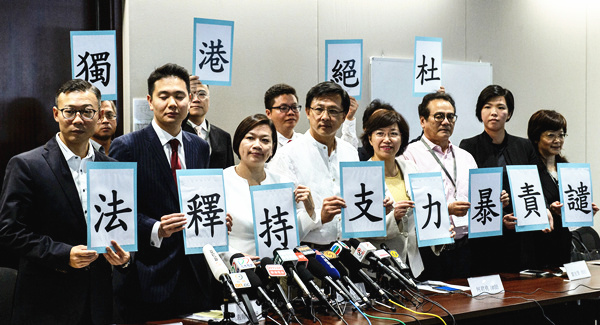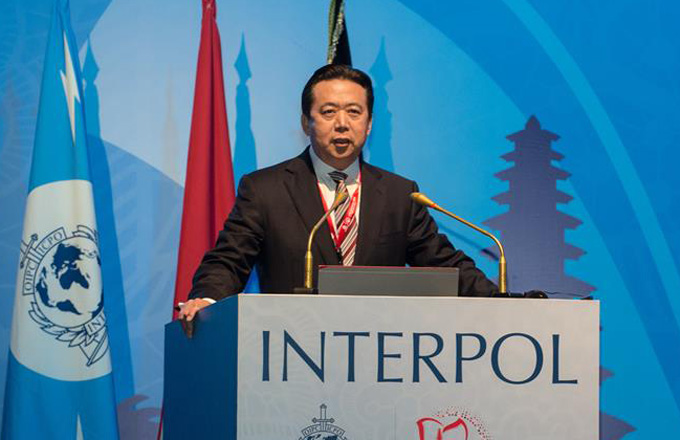Allegiance required to take office in HK
Sworn loyalty to Basic Law upheld by interpretation
 |
|
Local legislators hold up placards at a news conference in Hong Kong on Monday. The placards in the rear say, "Eradicate 'Hong Kong Independence'" while those in front say, "Condemn violence and support the law's interpretation". ANTHONY WALLACE / AFP |
The requirement applies to all high-level public administrators, lawmakers and judges in Hong Kong, according to the National People's Congress Standing Committee in its interpretation of the Basic Law.
The clarification of officials' oath-taking procedure for Hong Kong came after the behavior of a few newly elected lawmakers during their swearing-in on Oct 12 was criticized as improper.
Two newly elected lawmakers who took a separatist stand were seen on a live television broadcast to have altered their oaths and to have made obscene remarks about the nation.
The NPC Standing Committee's Basic Law interpretation is expected to offer legal grounds to Hong Kong's High Court in a judicial review submitted by the Hong Kong government over the pair's disqualification as members of the local Legislative Council.
The national legislature is "deeply concerned" about the harm that the pro-independence advocacy has had on Hong Kong and the nation as a whole, said Li Fei, deputy secretary-general of the NPC Standing Committee and chairman of its Basic Law Committee.
Zhang Dejiang, chairman of the NPC Standing Committee, said adoption of the Basic Law interpretation showcases the central government's firm opposition to "Hong Kong independence".
The interpretation was made regarding Article 104 of the Basic Law, which stipulates that when assuming office, all senior officials of the executive branch, members of the legislative council, and all judges and members of the judiciary in Hong Kong should "swear to uphold the Basic Law of the Hong Kong Special Administrative Region of the People's Republic of China and swear allegiance to the Hong Kong SAR of the People's Republic of China".
According to the interpretation, "to uphold the Basic Law" and to swear "allegiance to the Hong Kong SAR of the People's Republic of China" are not only part of the Basic Law's content, but also concrete requirements and preconditions specified in the article for standing for election and taking public office.
The interpretation stressed that the swearing-in is the "legal prerequisite" for public officials to assume office. No public office shall be assumed, no corresponding powers and functions shall be exercised, and no corresponding entitlements shall be enjoyed by anyone who fails to lawfully and validly take the oath or who declines to take the oath, it specifies.
It also clarifies that oath takers must take the oath "sincerely and solemnly", reading out the oath "accurately, completely and solemnly". One will be disqualified from assuming public office if he or she declines to take the oath, the interpretation said.
Li stressed that the National People's Congress Standing Committee's interpretation of the Basic Law is also a constitutional component of the city's legal system. By doing so, the NPCSC helps Hong Kong courts to implement the laws, Li said.
Article 158 of the Basic Law says that "the power of interpretation of the Basic Law should be vested in the NPCSC".
The Hong Kong government welcomed the action. The SAR's chief executive, Leung Chun-ying, emphasized that Hong Kong is an inalienable part of China and that all Hong Kong residents have the responsibility to safeguard sovereignty, national security and integrity of the country.
The Hong Kong Legislative Council's president, Andrew Leung Kwan-yuen, also supported the interpretation and said he expected the council to resume normal operations after the High Court hands down an expedited judgment based on the interpretation.
luisliu@chinadailyhk.com
















